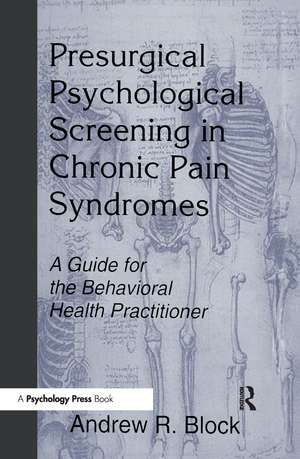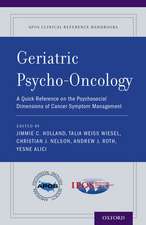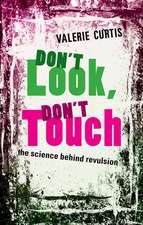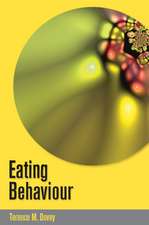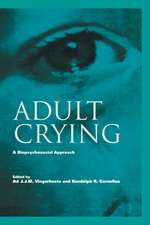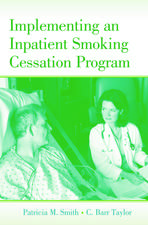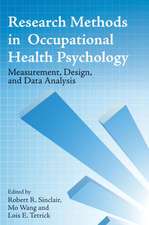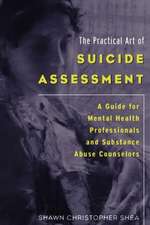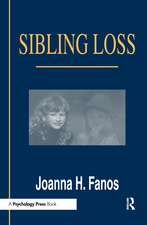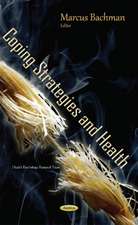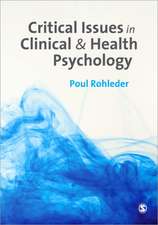Presurgical Psychological Screening in Chronic Pain Syndromes: A Guide for the Behavioral Health Practitioner
Autor Andrew R. Blocken Limba Engleză Hardback – aug 1996
This practice guide describes an approach to psychological evaluation of the chronic pain patient who is being considered for surgery. A large body of research is accumulating which demonstrates that the outcome of surgical procedures aimed at chronic pain relief can be strongly influenced by psychological and emotional factors. This approach, termed "presurgical psychological screening" (PPS) uses interview and testing techniques to identify emotional, behavioral, and psychosocial difficulties which have been demonstrated to negatively impact surgical outcome. Studies show that even patients with clearly identifiable pathophysiology may respond poorly to surgery, due to issues such as pain sensitivity, medication dependence, rewards for pain behavior and personality style. Thus, some insurance carriers, rehabilitation nurses and state worker's compensation systems are encouraging, or even requiring, presurgical psychological screening in cases of surgery designed to relieve chronic pain.
The first to present a comprehensive, unified approach to PPS in chronic pain syndromes, this text is designed to provide the behavioral health practitioner, as well as the trainee, with all the tools and information necessary to conduct PPS evaluations. It identifies a multitude of risk factors for poor surgical outcome and reviews research associated with each risk factor. Hands-on techniques for eliciting information from the patient about risk factors is also detailed. Toward this end, the practice guide also contains a number of forms and session outlines which can be directly utilized, or which can be altered to fit readers' needs. Models for weighing and combining surgical outcome risk factors are also provided. Thus, practitioners are able to reach valid and reliable predictions of surgical results. Finally, the text provides outlines of psychological interventions which can facilitate surgical outcome as well as surgical treatment alternatives. Upon completion of this practice guide, readers should be able to begin providing PPS evaluations which are scientifically valid, clinically sound, and which result in significant overall improvement in the treatment of chronic pain syndromes.
| Toate formatele și edițiile | Preț | Express |
|---|---|---|
| Paperback (1) | 481.58 lei 6-8 săpt. | |
| Taylor & Francis – aug 1996 | 481.58 lei 6-8 săpt. | |
| Hardback (1) | 934.29 lei 3-5 săpt. | +18.25 lei 6-12 zile |
| Taylor & Francis – aug 1996 | 934.29 lei 3-5 săpt. | +18.25 lei 6-12 zile |
Preț: 934.29 lei
Preț vechi: 1026.69 lei
-9% Nou
Puncte Express: 1401
Preț estimativ în valută:
178.82€ • 185.98$ • 149.85£
178.82€ • 185.98$ • 149.85£
Carte disponibilă
Livrare economică 20 februarie-06 martie
Livrare express 05-11 februarie pentru 28.24 lei
Preluare comenzi: 021 569.72.76
Specificații
ISBN-13: 9780805824070
ISBN-10: 0805824073
Pagini: 196
Ilustrații: Illustrations
Dimensiuni: 152 x 229 x 18 mm
Greutate: 0.39 kg
Ediția:1
Editura: Taylor & Francis
Colecția Psychology Press
Locul publicării:Oxford, United Kingdom
ISBN-10: 0805824073
Pagini: 196
Ilustrații: Illustrations
Dimensiuni: 152 x 229 x 18 mm
Greutate: 0.39 kg
Ediția:1
Editura: Taylor & Francis
Colecția Psychology Press
Locul publicării:Oxford, United Kingdom
Public țintă
ProfessionalCuprins
Contents: D.C. Turk, Foreword. Preface. Introduction and Overview. Pain Theories. Obtaining Medical Information. Interviewing the Spine Surgery Candidate. Psychometric Testing of Spine Surgery Candidates: Personality and Cognition. PPS Decision-Making: Determining Prognosis and Planning Treatment. PPS Reporting. General Applications of PPS in Chronic Pain Syndromes.
Recenzii
"The Phoenix is the mythological bird who rises anew from the ashes of its own funeral pyre. In their work on posttraumatic growth, Calhoun and Tedeschi put flesh and feathers on our hazy outline of this ancient symbol of resurrection. By focusing on the possibility of positive transformation after trauma, the authors urge clinicians to think outside the box, to consider all the ways in which the overwhelming energy of traumatic experience can be refocused on accelerating the dynamic of health instead of illness and injury."
—Sandra L. Bloom, MD
The Sanctuary, Horsham Clinic, Ambler PA; Author of Creating Sanctuary: Toward t
however. In this important volume, Dr. Andrew Block provides the rationale for a systematic protocol for presurgical psychological screening for chronic pain syndromes. Dr. Block's extensive clinical experience and research background render him eminently qualified to serve in this capacity. The two greatest advantages of this volume are the research basis for the proposed protocol and the practicality of the recommendations. Dr. Block's model for presurgical psychological screening is detailed but user-friendly and readily accessible to behavioral health practitioners, even those who have little background in chronic pain or experience in presurgical screening. Carefully following the guidelines established here should go a long way toward providing patients with approach alternatives or complimentary treatments and ultimately improving surgical outcomes."
—Dennis C. Turk, Ph.D.
Director, Pain Evaluation and Treatment Institute, University of Pittsburgh Medi
—Sandra L. Bloom, MD
The Sanctuary, Horsham Clinic, Ambler PA; Author of Creating Sanctuary: Toward t
however. In this important volume, Dr. Andrew Block provides the rationale for a systematic protocol for presurgical psychological screening for chronic pain syndromes. Dr. Block's extensive clinical experience and research background render him eminently qualified to serve in this capacity. The two greatest advantages of this volume are the research basis for the proposed protocol and the practicality of the recommendations. Dr. Block's model for presurgical psychological screening is detailed but user-friendly and readily accessible to behavioral health practitioners, even those who have little background in chronic pain or experience in presurgical screening. Carefully following the guidelines established here should go a long way toward providing patients with approach alternatives or complimentary treatments and ultimately improving surgical outcomes."
—Dennis C. Turk, Ph.D.
Director, Pain Evaluation and Treatment Institute, University of Pittsburgh Medi
Notă biografică
The WellBeing Group and The University of Texas Southwestern Medical School.
